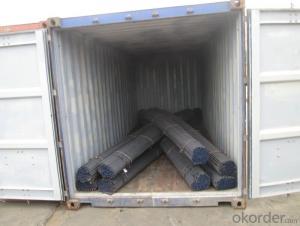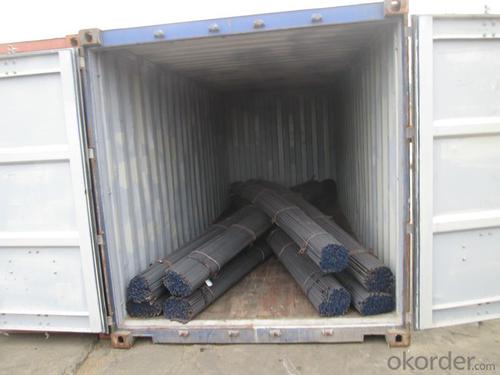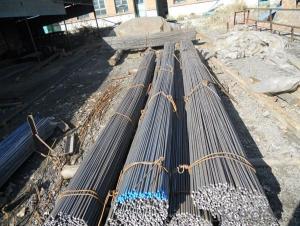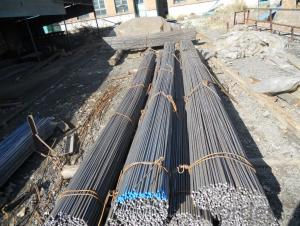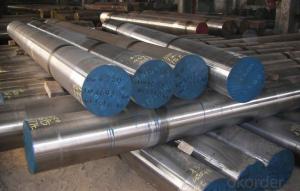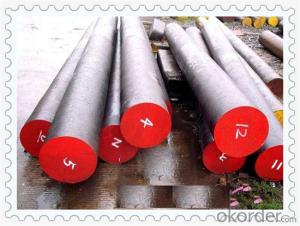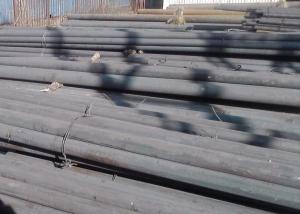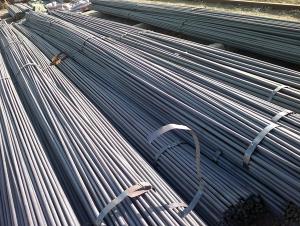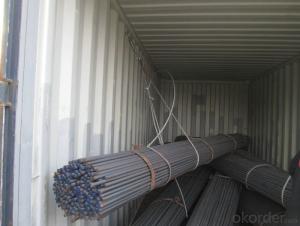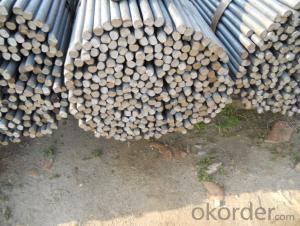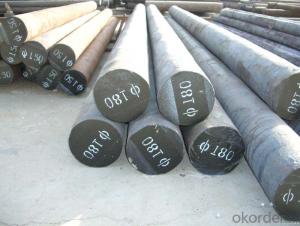Round Bar with Multiple Materials and High Quality for Sale
- Loading Port:
- China main port
- Payment Terms:
- TT OR LC
- Min Order Qty:
- 25 m.t.
- Supply Capability:
- 2000 m.t./month
OKorder Service Pledge
OKorder Financial Service
You Might Also Like
Specification
Product Description:
OKorder is offering Round Bar with Multiple Materials and High Quality for Sale at great prices with worldwide shipping. Our supplier is a world-class manufacturer of steel, with our products utilized the world over. OKorder annually supplies products to European, North American and Asian markets. We provide quotations within 24 hours of receiving an inquiry and guarantee competitive prices.
Product Applications:
Round Bar with Multiple Materials and High Quality for Sale are ideal for structural applications and are widely used in the construction of buildings and bridges, and the manufacturing, petrochemical, and transportation industries.
Product Advantages:
OKorder's Round Bar with Multiple Materials and High Quality for Sale are durable, strong, and resist corrosion.
Main Product Features:
· Premium quality
· Prompt delivery & seaworthy packing (30 days after receiving deposit)
· Corrosion resistance
· Can be recycled and reused
· Mill test certification
· Professional Service
· Competitive pricing
Packaging & Delivery:
Packaging Detail: products are packed in bundle and then shipped by container or bulk vessel, deformed bar is usually naked strapping delivery, when storing, please pay attention to moisture proof. The performance of rust will produce adverse effect.
Each bundle weight: 2-3MT, or as required
Payment term: TT or L/C
Delivery Detail: within 45 days after received advanced payment or LC.
Label: to be specified by customer, generally, each bundle has 1-2 labels
Trade terms: FOB, CFR, CIF
FAQ:
Q1: How do we guarantee the quality of our products? A1: We have established an advanced quality management system which conducts strict quality tests at every step, from raw materials to the final product. At the same time, we provide extensive follow-up service assurances as required. Q2: How soon can we receive the product after purchase? A2: Within three days of placing an order, we will begin production. The specific shipping date is dependent upon international and government factors, but is typically 7 to 10 workdays.
Q3: Why buy Materials & Equipment from OKorder.com?
A3: All products offered byOKorder.com are carefully selected from China's most reliable manufacturing enterprises. Through its ISO certifications, OKorder.com adheres to the highest standards and a commitment to supply chain safety and customer satisfaction.
Images:
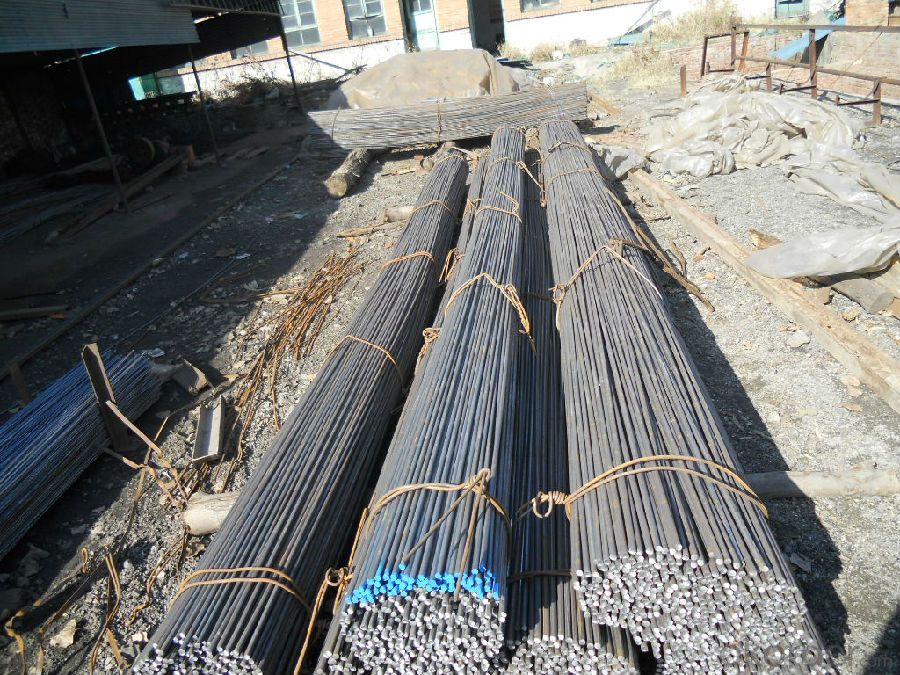
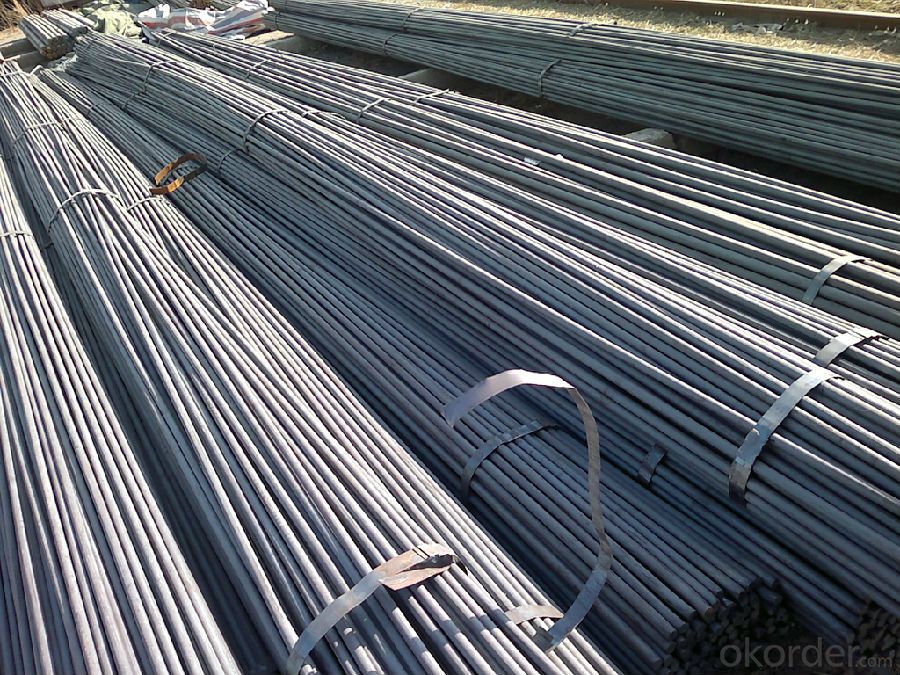
- Q: What are the different types of corrosion-resistant steel round bars?
- In the market, one can find a variety of corrosion-resistant steel round bars. The most commonly used types are as follows: 1. Stainless Steel Round Bars: Stainless steel is a popular choice when it comes to applications that require resistance to rust and corrosion. Its high resistance stems from the presence of chromium, which creates a protective oxide layer on the steel's surface, effectively preventing further corrosion. 2. Duplex Stainless Steel Round Bars: Duplex stainless steel is a unique type of stainless steel that combines austenite and ferrite microstructures in a balanced manner. This combination grants it exceptional corrosion resistance, high strength, and excellent weldability. 3. Nitronic Stainless Steel Round Bars: Nitronic stainless steel is an alloy known for its exceptional performance. It offers superior corrosion resistance, high strength, and good ductility. The presence of nitrogen further enhances its ability to resist pitting and crevice corrosion. 4. Alloy Steel Round Bars: Alloy steel refers to steel that has been alloyed with various elements in order to enhance its properties. Some alloy steels, including corrosion-resistant alloys (CRA), are specifically designed to withstand corrosion in harsh environments. These alloys typically contain elements such as chromium, nickel, and molybdenum. 5. Aluminum Round Bars: Although not technically steel, aluminum round bars are commonly used in applications where corrosion resistance is crucial. Aluminum forms a protective oxide layer on its surface, effectively preventing corrosion. It is particularly suitable for applications where weight is a concern. 6. Copper-Nickel Round Bars: Copper-nickel alloys, such as Cu-Ni 90/10 and Cu-Ni 70/30, are extensively utilized in marine and offshore applications due to their excellent resistance to seawater corrosion. These alloys possess high strength, good ductility, and exceptional resistance to biofouling. These examples represent only a fraction of the corrosion-resistant steel round bars available in the market. The choice of material depends on specific application requirements, environmental conditions, and budget considerations. Consulting a materials engineer or specialist is crucial in selecting the most suitable corrosion-resistant steel round bar for a particular application.
- Q: How are steel round bars stored?
- To ensure the safety and easy accessibility of steel round bars, they are typically stored in a manner that prioritizes these factors. One common storage method involves horizontally stacking the bars on a pallet or rack system, often bundling them together and securing them with straps or wire to prevent rolling or shifting. Another option is to store the bars vertically in racks, placing each bar in a designated slot to avoid contact or damage. In both cases, maintaining proper spacing between the bars is crucial to allow for sufficient air circulation and prevent potential corrosion. Additionally, it is essential to store steel round bars in a dry and covered area to shield them from moisture, dust, and other environmental elements. Proper labeling and inventory management systems are also of utmost importance to ensure easy identification and retrieval of the bars when necessary.
- Q: What are the different testing methods for steel round bars?
- There are several testing methods employed to assess the quality and performance of steel round bars. These methods include: 1. Tensile Testing: Tensile testing is conducted to determine the strength and elasticity of steel round bars. It involves applying a force to the bar until it reaches its breaking point, measuring the maximum load it can withstand before fracture occurs. This test helps to determine the ultimate tensile strength, yield strength, and elongation of the steel. 2. Hardness Testing: Hardness testing is used to assess the resistance of steel round bars to indentation or scratching. Common methods include the Rockwell, Brinell, and Vickers hardness tests. These tests provide valuable information about the material's ability to resist wear, deformation, and surface damage. 3. Charpy Impact Testing: Charpy impact testing measures the toughness and resistance to brittle fracture of steel round bars. The test involves striking a notched sample with a pendulum, measuring the energy absorbed during fracture. This test is crucial in evaluating the material's behavior under sudden impact or dynamic loading conditions. 4. Ultrasonic Testing: Ultrasonic testing utilizes high-frequency sound waves to detect internal flaws or defects in steel round bars. This non-destructive testing method can identify cracks, inclusions, or voids that may compromise the structural integrity of the material. 5. Magnetic Particle Inspection: This testing method is used to identify surface cracks or defects in steel round bars. It involves magnetizing the material and applying iron particles or magnetic ink. Any surface cracks or flaws will cause a leakage of magnetic flux, making them visible under proper lighting. 6. Visual Inspection: Visual inspection is a basic yet essential method for evaluating the quality of steel round bars. It involves examining the bar's surface for any visible defects, such as pits, scratches, or irregularities in shape or dimensions. 7. Chemical Analysis: Chemical analysis helps determine the composition of steel round bars by measuring the percentage of various elements present in the material. This information is crucial in ensuring that the steel meets the required specifications and is suitable for its intended application. Overall, a combination of these testing methods is employed to ensure the quality, performance, and reliability of steel round bars in various industries such as construction, manufacturing, and engineering.
- Q: How do you calculate the weight of a steel round bar based on its volume and density?
- To calculate the weight of a steel round bar based on its volume and density, you can use the formula: weight = volume x density.
- Q: How do you calculate the weight of a steel round bar based on its length, diameter, and density?
- To calculate the weight of a steel round bar, you can use the formula: weight = (π * density * diameter^2 * length) / 4.
- Q: What are the different types of tests performed on steel round bars for quality control?
- There are several types of tests performed on steel round bars for quality control purposes. These tests help to ensure that the steel bars meet the required standards and specifications. Some of the common tests conducted on steel round bars include: 1. Tensile Test: This test evaluates the tensile strength, yield strength, and elongation properties of the steel bars. It involves applying a pulling force to the bar until it breaks, measuring the maximum force the bar can withstand, and determining the bar's ability to stretch without fracturing. 2. Hardness Test: The hardness test measures the resistance of the steel bar to indentation or scratching. It provides an indication of the bar's strength and durability. Common hardness tests include Rockwell, Brinell, and Vickers tests. 3. Chemical Composition Analysis: This test determines the chemical composition of the steel round bars, including the percentage of various elements such as carbon, manganese, sulfur, phosphorus, and others. It ensures that the bars meet the specified chemical composition requirements. 4. Ultrasonic Testing: Ultrasonic testing uses high-frequency sound waves to detect any internal defects or discontinuities within the steel bars. This non-destructive test helps identify cracks, voids, or other defects that may affect the bar's structural integrity. 5. Dimensional Inspection: This test ensures that the steel round bars meet the required dimensional tolerances, including diameter, length, and straightness. It involves using precision measuring instruments such as calipers, micrometers, and gauges to verify the bar's dimensions. 6. Surface Quality Examination: This test inspects the surface condition of the steel bars for any defects, such as cracks, pits, scratches, or other surface irregularities. It is crucial to ensure that the bars have a smooth and defect-free surface for proper functionality and safety. 7. Microstructure Analysis: Microstructure analysis involves examining the steel bar's internal structure under a microscope. It helps determine the grain size, inclusion content, and overall microstructural integrity of the bars. This analysis provides insights into the bars' mechanical properties and their ability to withstand various loads and stresses. By performing these tests, manufacturers can ensure that the steel round bars meet the required quality standards and are suitable for their intended applications.
- Q: What are the advantages of using nickel-chromium alloy steel round bars?
- Using nickel-chromium alloy steel round bars in various applications offers several benefits. Firstly, these round bars possess outstanding corrosion resistance properties. The inclusion of nickel and chromium elements in the alloy enhances its ability to withstand corrosion from moisture, chemicals, and oxidation, making it suitable for use in challenging environments like marine applications, chemical processing plants, and oil refineries. Secondly, these round bars exhibit high temperature resistance. The combination of nickel and chromium in the alloy allows it to endure elevated temperatures without compromising its structural integrity. This makes them ideal for use in heat exchangers, furnaces, and other high-temperature applications. Furthermore, these round bars boast exceptional mechanical properties. They demonstrate excellent strength, toughness, and wear resistance, making them ideal for applications that require high load-bearing capabilities. Additionally, they exhibit good ductility, enabling easy machining and fabrication. Additionally, these round bars possess good electrical conductivity, making them suitable for electrical and electronic applications where conductivity is crucial, such as in the manufacturing of resistors, heating elements, and electrical connectors. Lastly, these round bars are readily available and cost-effective. Being a widely used material in various industries, they are easily accessible and can be obtained at competitive prices. In conclusion, the advantages of utilizing nickel-chromium alloy steel round bars encompass excellent corrosion resistance, high-temperature resistance, superior mechanical properties, good electrical conductivity, and cost-effectiveness. These characteristics make them the preferred choice for a wide range of applications in industries such as construction, automotive, aerospace, and electrical engineering.
- Q: How do I determine the strength and hardness of a steel round bar?
- In order to assess the strength and hardness of a steel round bar, various methods and tests can be employed: 1. Tensile Test: The strength of a steel bar is commonly determined through this method. It involves subjecting the bar to a tensile force until it fractures, and measuring the maximum force or load it can endure. This test provides information on the bar's ultimate tensile strength, yield strength, and elongation. 2. Hardness Test: Several techniques, such as the Rockwell, Brinell, and Vickers hardness tests, can be utilized to measure the hardness of a steel bar. These tests entail indenting the bar's surface using a standardized indenter and gauging the resulting indentation size. The obtained hardness value indicates the bar's resistance to deformation and wear. 3. Charpy Impact Test: This test gauges the toughness of a steel bar by striking it with a swinging pendulum and measuring the energy absorbed during fracture. It helps assess the bar's ability to withstand brittle fracture under conditions of impact loading. 4. Microstructural Analysis: Examining the microstructure of the steel bar through microscopic observation can offer insights into its mechanical properties. By preparing a polished and etched sample and inspecting it under a microscope, the presence of different phases, grain size, and any structural irregularities can be observed. Various microstructural features can impact the bar's strength and hardness. 5. Chemical Composition Analysis: The chemical composition of the steel bar, particularly the carbon content, significantly influences its strength and hardness. Analyzing the composition using techniques like spectroscopy or chemical analysis can provide valuable information about the bar's mechanical properties. It should be emphasized that these tests and techniques must be carried out by qualified professionals in a controlled laboratory setting to ensure accurate and reliable results. Moreover, specific standards and specifications may exist for different applications, so referring to relevant standards and guidelines can offer further guidance on determining the strength and hardness of a steel round bar.
- Q: What are the typical price ranges for steel round bars?
- The typical price ranges for steel round bars vary depending on factors such as the diameter, length, grade, and market conditions. However, generally speaking, the price range for steel round bars can range from $0.50 to $3 per pound or more.
- Q: What are the different types of steel round bar alloys used in the aerospace industry?
- There are several different types of steel round bar alloys used in the aerospace industry, including stainless steel, titanium alloy, nickel alloy, and carbon steel. These alloys offer specific properties such as high strength, corrosion resistance, and heat resistance, making them suitable for various applications in aircraft manufacturing.
Send your message to us
Round Bar with Multiple Materials and High Quality for Sale
- Loading Port:
- China main port
- Payment Terms:
- TT OR LC
- Min Order Qty:
- 25 m.t.
- Supply Capability:
- 2000 m.t./month
OKorder Service Pledge
OKorder Financial Service
Similar products
Hot products
Hot Searches
Related keywords
